MOVIES
Mexico, 2011, 8 min
Barbara Nickl
27.01.2012 22:25
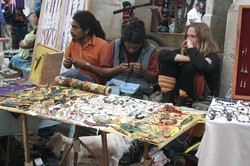 A short documentary about travelling and the desire to move. It focuses on the ideas and stories of Artesanos – people who live a nomadic lifestyle, travel around Latin America and produce their own jewellery in order to fund their lives. It questions the reasons for choosing this way of life, the significance of travelling and represents their invisibility and intangibility while moving. It is a mix of Super 8, Photographs and sound.
A short documentary about travelling and the desire to move. It focuses on the ideas and stories of Artesanos – people who live a nomadic lifestyle, travel around Latin America and produce their own jewellery in order to fund their lives. It questions the reasons for choosing this way of life, the significance of travelling and represents their invisibility and intangibility while moving. It is a mix of Super 8, Photographs and sound.
Barbara graduated MA Visual Anthropology at University of Manchester and Munich´s University.
Director and production: Barbara Nickl
Language of dialogues: English, Spanish
Language of subtitles: English
Brazil, 2010, 24 min
Capa de Índio
27.01.2012 18:10
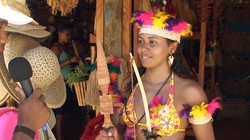 Participatory video, made by a couple of Indians of the Reserve of Coroa Vermelha, northern Brazil. The young directors approach with their camera the tourists that come to see the Indians, or plan to relax on the Reserve´s magnificent beaches. The filmic encounter between the „ native“ and the „Other“ leads both of them to amore through reflection about the „image“ of Indianness.
Participatory video, made by a couple of Indians of the Reserve of Coroa Vermelha, northern Brazil. The young directors approach with their camera the tourists that come to see the Indians, or plan to relax on the Reserve´s magnificent beaches. The filmic encounter between the „ native“ and the „Other“ leads both of them to amore through reflection about the „image“ of Indianness.
Director: Aelson Pataxó a kol.
Production: Cinepataxó and Ponto de Cultura Pataxó de Coroa Vermelha
Language of dialogues: Portuguese
Language of subtitles: English, Czech
Lauching of movie (selection):
III Festival do Filme Etnográfico de Recife, Brasil, 2011
Days of Etnographic Cinema, Moscaw, Russia, 2011
VII Conferencia International Imagenes da Cultura, Sao Paulo, Brasil, 2011
International Ethno Film Fest, Dakovo, Croatia, 2011
Cineclube do Núcleo de Antropologia Visual de Bahia, Salvador, 2011
Hungary, 2011, 8 min
T.Hirt, S.G.Lutherová, S.Novac, K.Varsányi
28.01.2012 15:15
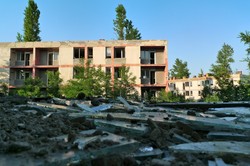 After the end of the Cold War, a lot of army bases in the East Europe became abandoned. Soldiers and their families have left, roaring of fighters has died away, univited guests stopped comming to public places. How do inhabitants of the formerly adjacent villages feel about the stay of Russian soldiers twenty years later?
After the end of the Cold War, a lot of army bases in the East Europe became abandoned. Soldiers and their families have left, roaring of fighters has died away, univited guests stopped comming to public places. How do inhabitants of the formerly adjacent villages feel about the stay of Russian soldiers twenty years later?
A short documentary Cold War Neighbours raises a question of how global events are reflected in local conditions. People, who live in the neighbourhood of a huge army base abandoned by the invaders in Hungarian Kunmadarás, talk about what the stay of the soldiers meant for them. And what their absence means for them today.
The film originated in the scope of a workshop “Anthropological Filmmaking” organised at Central European University in summer 2011.
The authors are social anthropologists who are studying or working at various universities in Central Europe. Their common interest is visual anthropology.
Directors: Tomáš Hirt (Czech Republic),Soňa G. Lutherová (Slovak Republic),Sergiu Novac (Romania),Kata Varsányi (Hungary)
Production:Central European University, Maďarsko
Language of dialogues: Hungarian
Language of subtitles: English
Norway, 2007, 57 min
Rossella Ragazzi
28.01.2012 20:40
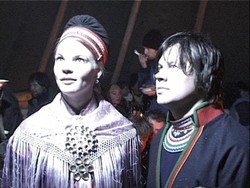 This film narrates the meeting with Sara Marielle Gaup and Lawra Somby, two young performers of joik (Sami chanting technique), born in the north and the south of Sápmi (the cultural nationhood of Sami people in North Norway, Sweden, Finland and Russia). They have come together through a creative musical project called “Adjágas” which in Sami means “the state between sleep and awakening”. In this peculiar state one can unveil reality and tune into the most profound and original joiks. Adjágas, in this way bring the musical-lyrical practice of joik toward the international musical scene by performing with musicians of different horizons, and adapting its performances to the context of reception. The protagonists express different ways of life and concerns, relating also to what it means to be young artists with an indigenous background, having to work a way into the musical industry. It is also a film about what in the waves of the past is worth struggling for understanding, and how joik brings together everyday life, politics and spirituality and becomes a language healing the pain from the colonial history of the past.
This film narrates the meeting with Sara Marielle Gaup and Lawra Somby, two young performers of joik (Sami chanting technique), born in the north and the south of Sápmi (the cultural nationhood of Sami people in North Norway, Sweden, Finland and Russia). They have come together through a creative musical project called “Adjágas” which in Sami means “the state between sleep and awakening”. In this peculiar state one can unveil reality and tune into the most profound and original joiks. Adjágas, in this way bring the musical-lyrical practice of joik toward the international musical scene by performing with musicians of different horizons, and adapting its performances to the context of reception. The protagonists express different ways of life and concerns, relating also to what it means to be young artists with an indigenous background, having to work a way into the musical industry. It is also a film about what in the waves of the past is worth struggling for understanding, and how joik brings together everyday life, politics and spirituality and becomes a language healing the pain from the colonial history of the past.
Rossella Ragazzi, born in Rome, Italy 1965. Filmmaker, ethnographer and associate professor in visual anthropology and museology at the University of Tromsø, Norway. Graduated from National Italian Film School in Rome, and University of Paris and got PhD in Visual Anthropology in Ireland. She co-founded with Britt Kramvig and Ingeborg Solvang film company Sonar Film in 2003.
Director: Rossella Raggazzi
Production: Sonar Film Tromso
Language of dialogues: English, Sami, Norwegian
Language of subtitles: English, Czech
Estonia, 2010, 68 min
Liivo Niglas
28.01.2012 13:15
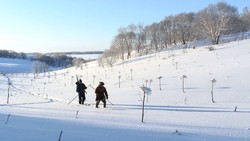 The action in the film revolves around an ancestrally used practice of hunting sable by net. Set in rural Kamchatka in the Russian Far East, where fewer than 20 speakers of Itelmen remain, the film goes beyond its original aim to recapture a language and a hunting practice that are remembered but no longer in use. Two hunters encounter the wild environs and villages of Kamchatka as a history laden homeland and memories, nostalgia, resignation and hope echo throughout the film.
The action in the film revolves around an ancestrally used practice of hunting sable by net. Set in rural Kamchatka in the Russian Far East, where fewer than 20 speakers of Itelmen remain, the film goes beyond its original aim to recapture a language and a hunting practice that are remembered but no longer in use. Two hunters encounter the wild environs and villages of Kamchatka as a history laden homeland and memories, nostalgia, resignation and hope echo throughout the film.
Liivo Niglas, born in Estonia in 1970 is currently a lecture of ethnology at University of Tartu, Estonia. He also runs an independent production company, Mp Doc, for anthropological documentary films. He has made films in Siberia, Africa, Central Asia and North America. Some of his work are “The Brigade” (2000), “Yuri Vellas´s World” (2003), “Adventure High” (2004), “Making Rain” (2007).
Director and production: Liivo Niglas
Language of dialogues: Russian, Itelmen
Language of subtitles: English
Lauching of film and award (selection):
International Festival of Ethnological Film, Belgrade, Serbia, 2011. Grand Prix.
Sardinia International Ethnographic Film Festival, Nuoro, Italy, 2010
Festival of Visual Anthropology ASPEKTY, Torun, Poland, 2010
Parnu International Documentary and Anthropology Film Festival, Parnu, Estonia, 2011
Poland, 2011, 45 min
Maciej Eichelberger, Lukasz Kaminski
27.01.2012 20:10
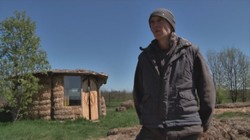 The filmmakers follow various alternative forms of socail thought, based on cooperation, openness and direct exchange of experience. They encounter on the various initiatives that seek to restore the dynamic exchange of people and culture. Dialoque with representatives and activists such as: open source trends, Permaculture, Qi gong, „Art exchange“, „Food not bombs“, presents a new from of „gift“ meaning.
The filmmakers follow various alternative forms of socail thought, based on cooperation, openness and direct exchange of experience. They encounter on the various initiatives that seek to restore the dynamic exchange of people and culture. Dialoque with representatives and activists such as: open source trends, Permaculture, Qi gong, „Art exchange“, „Food not bombs“, presents a new from of „gift“ meaning.
Maciej Eichelberger: Graduated from the academy of film and television in Warsaw, has studied anthropology at Warsaw University, author of the documentary and reports, permaculture activist.
Lukasz Kaminski: student of anthropology at Warsaw University, author of documentary film. He travels and writes.
Directiors and production: Maciej Eichelberger, Lukasz Kaminski
Language of dialogues: Polish, English
Language of subtitles: English, Polish, Czech
Lauching of movie:
"Eyes and Lenses" - 8th Ethnografic Film Review, Warsaw, 2011
Great Britain, 2011, 65 min
M.Rutten, S. Verstappen, I.Makay
28.01.2012 12:00
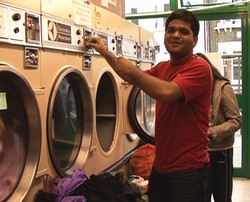 Youngsters in developing countries all over the world dream of going to the West. They hope to earn money and get overseas experience to improve their positions at home. But once they arrive, they end up in low-status jobs and living crammed into small houses of other newly arrived migrants.
Youngsters in developing countries all over the world dream of going to the West. They hope to earn money and get overseas experience to improve their positions at home. But once they arrive, they end up in low-status jobs and living crammed into small houses of other newly arrived migrants.
This film follows the daily life in one such house in East London. The bunker beds are filled with young Indians, all from relatively wealthy families in Gujarat. When they return to visit India, their families have great expectations of their sons and daughters. Will these youngsters fulfill their own and their families´dream?
Sanderien Verstappen is a PhD. reasearcher in Anthropology at the University of Amsterdam. Her reasearch project focuses on the impact of emigration and remittances in central Gujarat (India).
Mario Rutten in Professor of Comparative Anthropology and Sociology of Asia at the University of Amsterdam. He has conducted extensive research on rural enterpreneurship and labour relations in India, Indonesia and Malaysia and on Indian migrants in Europe and their linkages with their homeregion in Gujarat, India.
Isabelle Makay is a visual anthropologist/documentary maker and teaches at the Design Academy Eindhoven. She directed several short documentaries.
Directors: M.Rutten, S. Verstappen, I.Makay
Production: Josaphatpark Productions BVBA
Language of dialogues: English, Gujarati
Language of subtitles: English, Czech
Germany, 2010, 5 min
Alina Trebbin
27.01.2012 22:35
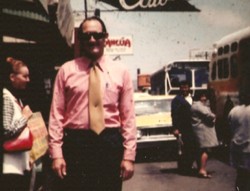 Consuming images is a daily experience. Before learning how to read words, we learn to read pictures. Details are the keys that help us to contextualize, to compose countless notions of the whole from which we now see just the extract contained in a once chosen framing. But are we ever really able to reconstruct past moments depicted in foreign photograph that are someone´s materialized memories? Can we reach a clear undestanding of what should be remembered when already two people looking at a picture see two different picture just as two people with open eyes see two different worlds? Watching a photograph together means to journey on different paths into the past..Still the viewers eyes can meet – in a wine glass on the left bottom corner.
Consuming images is a daily experience. Before learning how to read words, we learn to read pictures. Details are the keys that help us to contextualize, to compose countless notions of the whole from which we now see just the extract contained in a once chosen framing. But are we ever really able to reconstruct past moments depicted in foreign photograph that are someone´s materialized memories? Can we reach a clear undestanding of what should be remembered when already two people looking at a picture see two different picture just as two people with open eyes see two different worlds? Watching a photograph together means to journey on different paths into the past..Still the viewers eyes can meet – in a wine glass on the left bottom corner.
This short film wants to take a look at the limits of photography in reviving bygone moments to the eyes of the stranger who encodes images on the basis of his own memories and undestanding that are more and more interwoven with those of others. We add new layers of meaning to the pictures we consume and create our own truth about situatons we were initially not part of but have become as the present audience. In this way, the strange viewer enriches the unknown photograph just as it enriches him, a process of silent exchange that involves more than just the sense of sight.
Alina Trebbin is a Master´s candidate of Visual and Media Anthropology at Freie Universitat Berlin who researches among other things on the agency of photography. Meet me in memoriam is a short film she contribute to a student film compilation on haptic cinema and transcultueal montage during a Master´s Super8 workshop in 2010.
Director: Alina Trebbin
Production: Florian Walter, Mark Dolling
Language of dialogues: English
Language of subtitles: Germany
Lauching of movie:
Shortcutz Berlin, 2011
EMERGEANDSEE media arts festival Berlin 2011
Mexico, Great Britain, 2009, 25 min
Carolina Corral Paredes
27.01.2012 19:25
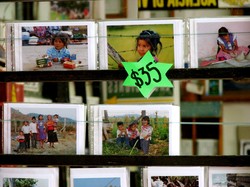 Doňa Rosa is an indigenous old woman who sells crafts in the market. Carlos is an enthusiastic tour guide who offers tours into indigenous people´s houses and families, including Paola´s. Their lives are dedicated to provide what a group of inquisitive tourists – and a filmaker – might be looking for in an indigenous and picturesque region in the southern Mexican state of Chiapas.
Doňa Rosa is an indigenous old woman who sells crafts in the market. Carlos is an enthusiastic tour guide who offers tours into indigenous people´s houses and families, including Paola´s. Their lives are dedicated to provide what a group of inquisitive tourists – and a filmaker – might be looking for in an indigenous and picturesque region in the southern Mexican state of Chiapas.
Carolina Corral Paderes graduated from the MA in Visual Anthropology in 2009 from the University of Manchester and enrolled in the Socail Anthropology with Visual Media PhD program at the same University. She is currently developing a collaborative project involving film that will look at the lives of former prisoners in Mexico.
Director and production: Carolina Corral Paderes
Language of dialogues:Spanish, English
Language of subtitles: English, Czech
Lauching of movie (selection):
Etnofilm ČADCA, Slovakia, Award of the film Journalist
Contro Sguardi, International Anthropological Film Festival, Italy,2010, Special Mention
14 Mostra Internacional de Filme Etnográfico, Rio de Janeiro, Brasil, 2009
Festival du Filme Ethnographic Film Festival, London, Great Britain, 2010
Ethnographic Film Unit Festival, British Colombia, Canada, 2010
II. Festival do Filme Etnográfico de Recife, Recife, Brasil, 2010
XIX International Festival of Ethnological Film, Belgrade, Serbia, 2010
Royal Anthropological Institut, Manchester, Great Britain, 2011
Days of etnographic cinema, Moscow, Russian, 2011
USA, 2008, 6 min
Jonathan Taee
27.01.2012 18:05
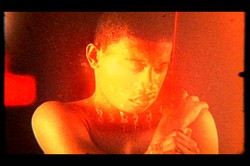 Maurice Merleau-Ponty was a French philosopher who died at the young age of 57 in 1961. His work on Phenomenology opened up a new realm in continental philosophy. He managedto get philosophers to think of the body as a required and fundamental element of existence, rather than a simple vessel that carries the mind. He understood the importance of its fleshy boundaries and its ability to perceive the world through a string of immediate moments. Hisphilosophies have gone on to shape and inform many social theories used in Anthropology.
Maurice Merleau-Ponty was a French philosopher who died at the young age of 57 in 1961. His work on Phenomenology opened up a new realm in continental philosophy. He managedto get philosophers to think of the body as a required and fundamental element of existence, rather than a simple vessel that carries the mind. He understood the importance of its fleshy boundaries and its ability to perceive the world through a string of immediate moments. Hisphilosophies have gone on to shape and inform many social theories used in Anthropology.
The film explores the body and the way it experiences the world. Each frame represents a moment, the moment before the body's experiences are captured by the consciousness and given cultural or emotional meanings and interpretations. The body does not sense the world through 5 set senses, feeling, seeing, hearing, tasting and smelling. The raw body senses the world as one big sensing organ. It experiences the world in one immediate relationship of body to world. The body has a synaesthetic sense that operates below the consciousness, as one flesh. This sense speaks through the entire body, using every contour and curve to feel the world it moves through. The raw body is immediate in its experiencing of the world, it is fluid and conversational, ever reading, learning and changing to the world around it.
This film honours the work of Merleau-Ponty, and through the mediums of 16mm, high speed digital film and SLR still imaging, it pays homage our most sensuous and intimate relations to the world around us.
Jonathan is a currently conducting field work in Bhutan for his PhD in Social Anthropology at the University of Cambridge. His current research explores the integration of healthcare in Bhutan and its affects on patients’ healing experiences.Concepts of body, experience and phenomenology have been a constant companion to his work, including the philosophies of Merleau-Ponty. This film was made at the University of Virginia while exploring the philosopher’s ideas of flesh and experience as socially contingent phenomena.
Director and production: Jonathan Taee
Language of dialogues: none
Language of subtitles: none
Launching of movie:
Salmagundi Film Festival, University of Virginia, USA
Ivy Film Festival, USA
Slovenia, Slovakia, Denmark, 2011, 6 min
Barbara Turk Niskač, Sašo Niskač
27.01.2012 22:41
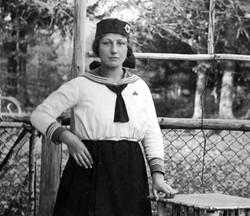 Short ethno documentary about memories of one childhood.
Short ethno documentary about memories of one childhood.
Barbara is anthropologist and Sašo is filmaker. Both of them are from Lubljana
Director: Barbara Turk Niskač, Sašo Niskač
Production: 3little wolves
Language of dialogues: Slovenia
Language of subtitles: English
WORLD PREMIERE!!!
Česká republika, 2011, 24 min
L.Hollerová, T.Hirt, M. Hertlová
28.01.2012 15:25
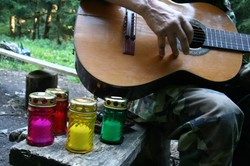 Production: Centrum of apply anthropology and research, University of West Bohemia in Pilsen
Production: Centrum of apply anthropology and research, University of West Bohemia in Pilsen
Language of dialogues: Czech, English
Language of subtitles: English
Hungary, 2011, 8 min
H. Synková, R. K. Ranjan, J.V. Asis
28.01.2012 14:45
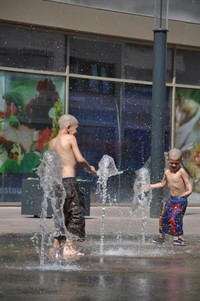 The process of rehabilitation and gentrification in the Eight District of Budapest, Hungary has led to the shrinkage of space especially for children’s play. Set against the backdrop of the world famous novel The Paul Street Boys (Molnár Ferenc, 1906) this film depicts the widening gap between social classes and the reconstruction of the ideas of play, security and leisure.
The process of rehabilitation and gentrification in the Eight District of Budapest, Hungary has led to the shrinkage of space especially for children’s play. Set against the backdrop of the world famous novel The Paul Street Boys (Molnár Ferenc, 1906) this film depicts the widening gap between social classes and the reconstruction of the ideas of play, security and leisure.
Ram Krishna Ranjan is a Delhi based freelance documentary filmmaker. He completed masters in Media and Cultural Studies. Currently he is working as a consultant for the Digital Empowerment Foundation, where he documents development projects across India.
Jonnabelle V. Asis is a Erasmus Mundus doctoral exchange student in the Universita' degli Studi di Padova and a Ph.D. Sociology student from the University of the Philippines Diliman. She was assistant professor of the Department of Sociology, University of the Philippines Diliman, where she taught courses on Sociology of Mass Communication and Visual Sociology.
Hana Synková is an assistant professor at the department of Social Sciences at Pardubice University and research coordinator at the Agency for Social Inclusion of the Office of the Government of the Czech Republic. Her research focuses on institutions active in “social integration”.
Directors: H. Synková, R.K. Ranjan, J.V. Asis
Production: Cenral European Univesity, Hungary
Language of dialogues: Hungarian, English
Language of subtitles: English
Hungary, 2011, 8 min
K.A. Eglinton, N. Benarrosh-Orsoni
28.01.2012 14:35
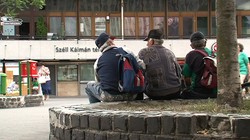 The square formerly known as Moszkva tér (Moscow Square) in Budapest is the setting for this short film. Through the documentation of people’s voices and activities, this film underlines how the city’s busiest transport hub is also a space that Budapest’s most profoundly marginalised groups rely on for their livelihood and survival.
The square formerly known as Moszkva tér (Moscow Square) in Budapest is the setting for this short film. Through the documentation of people’s voices and activities, this film underlines how the city’s busiest transport hub is also a space that Budapest’s most profoundly marginalised groups rely on for their livelihood and survival.
Kristen Ali Eglinton lives in London and is an applied visual ethnographer and qualitative researcher. She trained as a multi-media artist in the United States before getting a PhD in social and educational research. She has worked with diverse communities across the globe using innovative, digital and multi-media methods.
Norah Benarrosh-Orsoni, born in 1985, is a French PhD Student of Ethnology. She studies the migration process among Roma families living between France and Romania.
Directors: Kristen Ali Eglinton, Norah Benarrosh-Orsoni
Colombia, 2011, 28 min
Ben Cheetham
27.01.2012 18:45
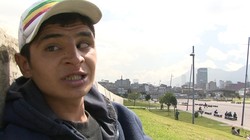 Walking through Bogotá it would be hard to ignore the overwhelming presence of those who call its streets home. Thousands of young people make up this sub-group of society, a legacy of decades of political instability. This film takes place in one of 26 houses set up by “the Institution for the Protection of Childhood and Adolescence“ (IDIPRON) located in the centre of Bogotá.
Walking through Bogotá it would be hard to ignore the overwhelming presence of those who call its streets home. Thousands of young people make up this sub-group of society, a legacy of decades of political instability. This film takes place in one of 26 houses set up by “the Institution for the Protection of Childhood and Adolescence“ (IDIPRON) located in the centre of Bogotá.
Saliendo Adelante explores the life of José who, now in his early 20´s, has lived on the streets since the age of 6. José is now attempting to change his life´s trajectory by talking part in a programme of social rehabilitation offered by the institution. Through the film we are also introduced to the work of Orlando, a teacher at the Institution, and his efforts to offer those like José other ways of visualizing the world around them.
I have recently graduated from a Master´s programme in visual anthropology at Granada Centre for Visual Anthropology at the University of Manchester. This film was my graduation project, which I received a distinction for. On the course I made a number of other films and photography based projects, largely informed and inspired by the principles of observational cinema.
Director and production: Ben Cheetham
Language of dialogues: Spanish
Language of subtitles: English, Czech
Great Britain, 2011, 28 min
Kieran Hanson
28.01.2012 19:15
 A decade since Sierra Leone's devastating civil war, from the ashes rises a new dawn of creativity in audio-visual media. Inspired by Jean Rouch's ‘shared anthropology’ and ‘ethno-fiction’, Shooting Freetown follows three people forging their way in film and music in the nation's capital, facing the constant struggles with vision and resourcefulness. By incorporating collaborative video projects, their stories give a fresh image of post-war Freetown - presented to the world through their own lens.
A decade since Sierra Leone's devastating civil war, from the ashes rises a new dawn of creativity in audio-visual media. Inspired by Jean Rouch's ‘shared anthropology’ and ‘ethno-fiction’, Shooting Freetown follows three people forging their way in film and music in the nation's capital, facing the constant struggles with vision and resourcefulness. By incorporating collaborative video projects, their stories give a fresh image of post-war Freetown - presented to the world through their own lens.
Kieran studied visual anthropology (ethnographic film) MA at Manchester University, carrying out his fieldwork in Freetown, Sierra Leone.
Director:Kieran Hanson
Production: Granada centre for Visual Anthropology, University of Manchester
Language of dialogues: English, Krio Language
Language of subtitles: English, Czech
EUROPEAN PREMIERE!!!
Portugal, Great Britain, 2011, 20 min
Ines Ponte
28.01.2012 20:10
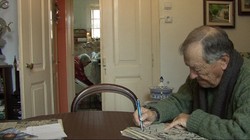 My grandparents have known one another since childhood. Of very different characters, the familiarity underpinning their relationship has been crafted through time. Both by the small episodes of everyday life, as well as by the longer duration of their lives.
My grandparents have known one another since childhood. Of very different characters, the familiarity underpinning their relationship has been crafted through time. Both by the small episodes of everyday life, as well as by the longer duration of their lives.
Ines Ponte was born in 1979, Lisbon, Portugal. Has a degree in Social Anthropology (Portugal, Netherlands), a post-graduation in documentary direction (Portugal), and presently develops work within visual anthropology (United Kingdom). She has worked also as editor, cameraman, production, research and writing assistant of documentary projects in Portugal.
Director: Ines Ponte
Production: Ines Ponte, Granada Centre for Visual Anthropology - University of Manchester
Language of dialogues: Portuguese
Language of subtitles: English, Czech
Česká republika, 2011, 99 min
Milan Durňak, Magdalena Koháková
28.01.2012 17:10
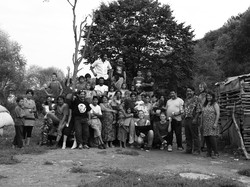 What should antropological films be like? How to come to terms with alternating view of the world and with stereotypes in us? In a 3-year span, this issue kept busy an execution team around Milan Durňak who went back to his home-village to capture life of Roma people together with their Ruthenian neighbours. Every stay in the Roma colony brought one episode of a film which captures everyday life, tries to describe problems which trouble them and constantly strive to jump over their own shadows. The spectator has a chance to encounter a story in a social-cummunity centre with a hard-working mayor and festivals in the village and think about the worries and merriments of one Roma colony.
What should antropological films be like? How to come to terms with alternating view of the world and with stereotypes in us? In a 3-year span, this issue kept busy an execution team around Milan Durňak who went back to his home-village to capture life of Roma people together with their Ruthenian neighbours. Every stay in the Roma colony brought one episode of a film which captures everyday life, tries to describe problems which trouble them and constantly strive to jump over their own shadows. The spectator has a chance to encounter a story in a social-cummunity centre with a hard-working mayor and festivals in the village and think about the worries and merriments of one Roma colony.
Milan Durňak graduated at Charles Univerity in Prague, main field ethnology. Currently he is working at the University as a Phd student. In his studies, he mainly deals with visual anthropology and creation of antropological films.
Director: Milan Durňak
Production: Milan Durňak, Magdalena Koháková
Language of dialogues: Slovakian, Czech, Rusyn language, Gypsy language
Language of subtitles: Slovakian
The Netherlands, 2011, 29 min
Fedor Ikelaar
28.01.2012 16:15
 The road, to most of us simply a path leading to a destination, but to many truck drivers the road itself is their destination, their goal and their home. To them the road is a cold-hearted mistress that dominates their lives. In this documentary three of these truck drivers are followed on that road as they passionately explain what drew them to truck driving and what is so extraordinary about their jobs. They talk openly and reflectively about the thoughts, hopes, dreams and aspirations that keep them going and help them position this demanding job into their lives. Through both humour and sorrow surprising sides and depths of these seemingly tough men with their apparent uncomplicated lives are disclosed.
The road, to most of us simply a path leading to a destination, but to many truck drivers the road itself is their destination, their goal and their home. To them the road is a cold-hearted mistress that dominates their lives. In this documentary three of these truck drivers are followed on that road as they passionately explain what drew them to truck driving and what is so extraordinary about their jobs. They talk openly and reflectively about the thoughts, hopes, dreams and aspirations that keep them going and help them position this demanding job into their lives. Through both humour and sorrow surprising sides and depths of these seemingly tough men with their apparent uncomplicated lives are disclosed.
At the age of 27 Fedor abandoned a successful IT career to study anthropology at the VU University in Amsterdam. Anthropology became the ideal field to explore not only his interest in culture, development and conflict, but also to combine these with his passion for filmmaking. Though his own university has no visual ethnography in its program, he spent a lot of time exploring this field on his own or with some likeminded students. With these students he also started to make short ethnographic documentaries and a full length ethnographic production titled “The Challenge.” This experience led up to “What Keeps Them Going”, his first solo production. He recently graduated and has taken on a research position at the municipality of Amsterdam, he does not intend to abandon documentary filmmaking as he intends to do projects on the side to continue developing both his skills and style.
Director and production: Fedor Ikelaar
Language of dialogues: Dutch
Language of subtitles: English
Lauching of movie:
Athens Ethnographic Film Festival
 A short documentary about travelling and the desire to move. It focuses on the ideas and stories of Artesanos – people who live a nomadic lifestyle, travel around Latin America and produce their own jewellery in order to fund their lives. It questions the reasons for choosing this way of life, the significance of travelling and represents their invisibility and intangibility while moving. It is a mix of Super 8, Photographs and sound.
A short documentary about travelling and the desire to move. It focuses on the ideas and stories of Artesanos – people who live a nomadic lifestyle, travel around Latin America and produce their own jewellery in order to fund their lives. It questions the reasons for choosing this way of life, the significance of travelling and represents their invisibility and intangibility while moving. It is a mix of Super 8, Photographs and sound.
 Participatory video, made by a couple of Indians of the Reserve of Coroa Vermelha, northern Brazil. The young directors approach with their camera the tourists that come to see the Indians, or plan to relax on the Reserve´s magnificent beaches. The filmic encounter between the „ native“ and the „Other“ leads both of them to amore through reflection about the „image“ of Indianness.
Participatory video, made by a couple of Indians of the Reserve of Coroa Vermelha, northern Brazil. The young directors approach with their camera the tourists that come to see the Indians, or plan to relax on the Reserve´s magnificent beaches. The filmic encounter between the „ native“ and the „Other“ leads both of them to amore through reflection about the „image“ of Indianness. After the end of the Cold War, a lot of army bases in the East Europe became abandoned. Soldiers and their families have left, roaring of fighters has died away, univited guests stopped comming to public places. How do inhabitants of the formerly adjacent villages feel about the stay of Russian soldiers twenty years later?
After the end of the Cold War, a lot of army bases in the East Europe became abandoned. Soldiers and their families have left, roaring of fighters has died away, univited guests stopped comming to public places. How do inhabitants of the formerly adjacent villages feel about the stay of Russian soldiers twenty years later? This film narrates the meeting with Sara Marielle Gaup and Lawra Somby, two young performers of joik (Sami chanting technique), born in the north and the south of Sápmi (the cultural nationhood of Sami people in North Norway, Sweden, Finland and Russia). They have come together through a creative musical project called “Adjágas” which in Sami means “the state between sleep and awakening”. In this peculiar state one can unveil reality and tune into the most profound and original joiks. Adjágas, in this way bring the musical-lyrical practice of joik toward the international musical scene by performing with musicians of different horizons, and adapting its performances to the context of reception. The protagonists express different ways of life and concerns, relating also to what it means to be young artists with an indigenous background, having to work a way into the musical industry. It is also a film about what in the waves of the past is worth struggling for understanding, and how joik brings together everyday life, politics and spirituality and becomes a language healing the pain from the colonial history of the past.
This film narrates the meeting with Sara Marielle Gaup and Lawra Somby, two young performers of joik (Sami chanting technique), born in the north and the south of Sápmi (the cultural nationhood of Sami people in North Norway, Sweden, Finland and Russia). They have come together through a creative musical project called “Adjágas” which in Sami means “the state between sleep and awakening”. In this peculiar state one can unveil reality and tune into the most profound and original joiks. Adjágas, in this way bring the musical-lyrical practice of joik toward the international musical scene by performing with musicians of different horizons, and adapting its performances to the context of reception. The protagonists express different ways of life and concerns, relating also to what it means to be young artists with an indigenous background, having to work a way into the musical industry. It is also a film about what in the waves of the past is worth struggling for understanding, and how joik brings together everyday life, politics and spirituality and becomes a language healing the pain from the colonial history of the past. The action in the film revolves around an ancestrally used practice of hunting sable by net. Set in rural Kamchatka in the Russian Far East, where fewer than 20 speakers of Itelmen remain, the film goes beyond its original aim to recapture a language and a hunting practice that are remembered but no longer in use. Two hunters encounter the wild environs and villages of Kamchatka as a history laden homeland and memories, nostalgia, resignation and hope echo throughout the film.
The action in the film revolves around an ancestrally used practice of hunting sable by net. Set in rural Kamchatka in the Russian Far East, where fewer than 20 speakers of Itelmen remain, the film goes beyond its original aim to recapture a language and a hunting practice that are remembered but no longer in use. Two hunters encounter the wild environs and villages of Kamchatka as a history laden homeland and memories, nostalgia, resignation and hope echo throughout the film. The filmmakers follow various alternative forms of socail thought, based on cooperation, openness and direct exchange of experience. They encounter on the various initiatives that seek to restore the dynamic exchange of people and culture. Dialoque with representatives and activists such as: open source trends, Permaculture, Qi gong, „Art exchange“, „Food not bombs“, presents a new from of „gift“ meaning.
The filmmakers follow various alternative forms of socail thought, based on cooperation, openness and direct exchange of experience. They encounter on the various initiatives that seek to restore the dynamic exchange of people and culture. Dialoque with representatives and activists such as: open source trends, Permaculture, Qi gong, „Art exchange“, „Food not bombs“, presents a new from of „gift“ meaning. Youngsters in developing countries all over the world dream of going to the West. They hope to earn money and get overseas experience to improve their positions at home. But once they arrive, they end up in low-status jobs and living crammed into small houses of other newly arrived migrants.
Youngsters in developing countries all over the world dream of going to the West. They hope to earn money and get overseas experience to improve their positions at home. But once they arrive, they end up in low-status jobs and living crammed into small houses of other newly arrived migrants. Consuming images is a daily experience. Before learning how to read words, we learn to read pictures. Details are the keys that help us to contextualize, to compose countless notions of the whole from which we now see just the extract contained in a once chosen framing. But are we ever really able to reconstruct past moments depicted in foreign photograph that are someone´s materialized memories? Can we reach a clear undestanding of what should be remembered when already two people looking at a picture see two different picture just as two people with open eyes see two different worlds? Watching a photograph together means to journey on different paths into the past..Still the viewers eyes can meet – in a wine glass on the left bottom corner.
Consuming images is a daily experience. Before learning how to read words, we learn to read pictures. Details are the keys that help us to contextualize, to compose countless notions of the whole from which we now see just the extract contained in a once chosen framing. But are we ever really able to reconstruct past moments depicted in foreign photograph that are someone´s materialized memories? Can we reach a clear undestanding of what should be remembered when already two people looking at a picture see two different picture just as two people with open eyes see two different worlds? Watching a photograph together means to journey on different paths into the past..Still the viewers eyes can meet – in a wine glass on the left bottom corner. Doňa Rosa is an indigenous old woman who sells crafts in the market. Carlos is an enthusiastic tour guide who offers tours into indigenous people´s houses and families, including Paola´s. Their lives are dedicated to provide what a group of inquisitive tourists – and a filmaker – might be looking for in an indigenous and picturesque region in the southern Mexican state of Chiapas.
Doňa Rosa is an indigenous old woman who sells crafts in the market. Carlos is an enthusiastic tour guide who offers tours into indigenous people´s houses and families, including Paola´s. Their lives are dedicated to provide what a group of inquisitive tourists – and a filmaker – might be looking for in an indigenous and picturesque region in the southern Mexican state of Chiapas. Maurice Merleau-Ponty was a French philosopher who died at the young age of 57 in 1961. His work on Phenomenology opened up a new realm in continental philosophy. He managedto get philosophers to think of the body as a required and fundamental element of existence, rather than a simple vessel that carries the mind. He understood the importance of its fleshy boundaries and its ability to perceive the world through a string of immediate moments. Hisphilosophies have gone on to shape and inform many social theories used in Anthropology.
Maurice Merleau-Ponty was a French philosopher who died at the young age of 57 in 1961. His work on Phenomenology opened up a new realm in continental philosophy. He managedto get philosophers to think of the body as a required and fundamental element of existence, rather than a simple vessel that carries the mind. He understood the importance of its fleshy boundaries and its ability to perceive the world through a string of immediate moments. Hisphilosophies have gone on to shape and inform many social theories used in Anthropology. Short ethno documentary about memories of one childhood.
Short ethno documentary about memories of one childhood. Production: Centrum of apply anthropology and research, University of West Bohemia in Pilsen
Production: Centrum of apply anthropology and research, University of West Bohemia in Pilsen The process of rehabilitation and gentrification in the Eight District of Budapest, Hungary has led to the shrinkage of space especially for children’s play. Set against the backdrop of the world famous novel The Paul Street Boys (Molnár Ferenc, 1906) this film depicts the widening gap between social classes and the reconstruction of the ideas of play, security and leisure.
The process of rehabilitation and gentrification in the Eight District of Budapest, Hungary has led to the shrinkage of space especially for children’s play. Set against the backdrop of the world famous novel The Paul Street Boys (Molnár Ferenc, 1906) this film depicts the widening gap between social classes and the reconstruction of the ideas of play, security and leisure. The square formerly known as Moszkva tér (Moscow Square) in Budapest is the setting for this short film. Through the documentation of people’s voices and activities, this film underlines how the city’s busiest transport hub is also a space that Budapest’s most profoundly marginalised groups rely on for their livelihood and survival.
The square formerly known as Moszkva tér (Moscow Square) in Budapest is the setting for this short film. Through the documentation of people’s voices and activities, this film underlines how the city’s busiest transport hub is also a space that Budapest’s most profoundly marginalised groups rely on for their livelihood and survival. Walking through Bogotá it would be hard to ignore the overwhelming presence of those who call its streets home. Thousands of young people make up this sub-group of society, a legacy of decades of political instability. This film takes place in one of 26 houses set up by “the Institution for the Protection of Childhood and Adolescence“ (IDIPRON) located in the centre of Bogotá.
Walking through Bogotá it would be hard to ignore the overwhelming presence of those who call its streets home. Thousands of young people make up this sub-group of society, a legacy of decades of political instability. This film takes place in one of 26 houses set up by “the Institution for the Protection of Childhood and Adolescence“ (IDIPRON) located in the centre of Bogotá. A decade since Sierra Leone's devastating civil war, from the ashes rises a new dawn of creativity in audio-visual media. Inspired by Jean Rouch's ‘shared anthropology’ and ‘ethno-fiction’, Shooting Freetown follows three people forging their way in film and music in the nation's capital, facing the constant struggles with vision and resourcefulness. By incorporating collaborative video projects, their stories give a fresh image of post-war Freetown - presented to the world through their own lens.
A decade since Sierra Leone's devastating civil war, from the ashes rises a new dawn of creativity in audio-visual media. Inspired by Jean Rouch's ‘shared anthropology’ and ‘ethno-fiction’, Shooting Freetown follows three people forging their way in film and music in the nation's capital, facing the constant struggles with vision and resourcefulness. By incorporating collaborative video projects, their stories give a fresh image of post-war Freetown - presented to the world through their own lens. My grandparents have known one another since childhood. Of very different characters, the familiarity underpinning their relationship has been crafted through time. Both by the small episodes of everyday life, as well as by the longer duration of their lives.
My grandparents have known one another since childhood. Of very different characters, the familiarity underpinning their relationship has been crafted through time. Both by the small episodes of everyday life, as well as by the longer duration of their lives. What should antropological films be like? How to come to terms with alternating view of the world and with stereotypes in us? In a 3-year span, this issue kept busy an execution team around Milan Durňak who went back to his home-village to capture life of Roma people together with their Ruthenian neighbours. Every stay in the Roma colony brought one episode of a film which captures everyday life, tries to describe problems which trouble them and constantly strive to jump over their own shadows. The spectator has a chance to encounter a story in a social-cummunity centre with a hard-working mayor and festivals in the village and think about the worries and merriments of one Roma colony.
What should antropological films be like? How to come to terms with alternating view of the world and with stereotypes in us? In a 3-year span, this issue kept busy an execution team around Milan Durňak who went back to his home-village to capture life of Roma people together with their Ruthenian neighbours. Every stay in the Roma colony brought one episode of a film which captures everyday life, tries to describe problems which trouble them and constantly strive to jump over their own shadows. The spectator has a chance to encounter a story in a social-cummunity centre with a hard-working mayor and festivals in the village and think about the worries and merriments of one Roma colony. The road, to most of us simply a path leading to a destination, but to many truck drivers the road itself is their destination, their goal and their home. To them the road is a cold-hearted mistress that dominates their lives. In this documentary three of these truck drivers are followed on that road as they passionately explain what drew them to truck driving and what is so extraordinary about their jobs. They talk openly and reflectively about the thoughts, hopes, dreams and aspirations that keep them going and help them position this demanding job into their lives. Through both humour and sorrow surprising sides and depths of these seemingly tough men with their apparent uncomplicated lives are disclosed.
The road, to most of us simply a path leading to a destination, but to many truck drivers the road itself is their destination, their goal and their home. To them the road is a cold-hearted mistress that dominates their lives. In this documentary three of these truck drivers are followed on that road as they passionately explain what drew them to truck driving and what is so extraordinary about their jobs. They talk openly and reflectively about the thoughts, hopes, dreams and aspirations that keep them going and help them position this demanding job into their lives. Through both humour and sorrow surprising sides and depths of these seemingly tough men with their apparent uncomplicated lives are disclosed.